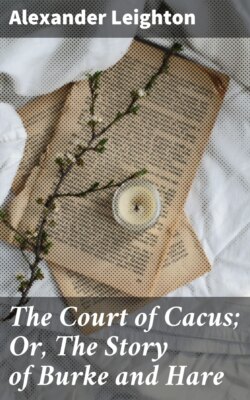Читать книгу The Court of Cacus; Or, The Story of Burke and Hare - Alexander Leighton - Страница 3
На сайте Литреса книга снята с продажи.
PREFACE.
ОглавлениеTable of Contents
I have not written this book,—narrating a series of tragedies unprecedented in the history of mankind, as well for the number of victims and the depth of their sufferings as for the sordid temptation of the actors,—without a proper consideration of what is due to the public and myself. If I had thought I was to contribute to the increase of a taste for moral stimulants, said to be peculiarly incident to our age—and yet, I suspect, as strong in all bygone times—and without any countervailing advantage to morals and the welfare of society, I would have desisted from my labours. But, being satisfied that what has really occurred on the stage of the world, however involving the dignity of our nature or revolting to human feelings, must and will be known in some way, wherever there are eyes to read or ears to hear, nay, was intended to be known by Him through whose permission it was allowed to be, I consider it a benefaction that the knowledge which kills shall be accompanied by the knowledge which cures. Nay, were it possible, which it is not, to keep from succeeding generations cases of great depravity punished for example, and atoned for by penitence, the man who tried to conceal them would be acting neither in obedience to God’s providence nor for the good of the people. We know what the Bible records of the doings of depraved men, and we know also for what purpose; and may we not follow in the steps of the inspired?
But a slight survey of the nature of the mind may satisfy any one, not necessarily a philosopher, that it requires as its natural food examples of evil with the punishment and the cure. If it had been so ordered that there were not in the soil of the heart congenital germs of wickedness ready to spring up and branch into crimes under favouring circumstances, which the complications of society are eternally producing, and that, consequently, all evil was sheer imitation, something might be said for concealing the thing to be imitated, even at the expense of losing the antidote. Even in that case the “huddlers-up” would not be very philosophical or very sensible; religious they could not be, because the supposition is adverse to the most fundamental truth of Christianity—for, as the imitation must of necessity be admitted to be catching, where so many are caught, the deterring influences would be more necessary. But as all must admit that the evil comes of itself and the antidote from man, those who would conceal the latter must allow to the former its full sway.
In all this, I do not overlook the benefits of abstract representations of the beauty of virtue and the ugliness of vice. These belong to the department of the imagination, where no principle of action resides; and every one knows that the images must be embodied, in particular instances taken from the real world of flesh and blood, so that the historian of real occurrences must still work as an adjunct even to the fancy. If it be said that he narrates stories that are revolting, the answer would seem to be that, as the law still justifies example, and society calls for it, the objection that the interest of a story is too deep can only be used by those who view the records of wickedness as a stimulant and not as a terror, or those who, amidst the still-recurring daily murders, consider society as beyond the need of amendment. The objection is thus an adjection. Fortunately, none of us are acquainted with amiable enormities, and the longer these remain unknown to us, the better for us and mankind; so that it seems to follow, that he who can render the acted crimes of history as disagreeable and hateful as they can be made, even with the aid of the dark shadows of his fancy, performs an act favourable to the interests of society. Yet I have done my best to save from revolt the feelings of the virtuous, as far as is consistent with the moral effect intended by Providence to be produced on the vicious.
York Lodge, Trinity, September 1861.
